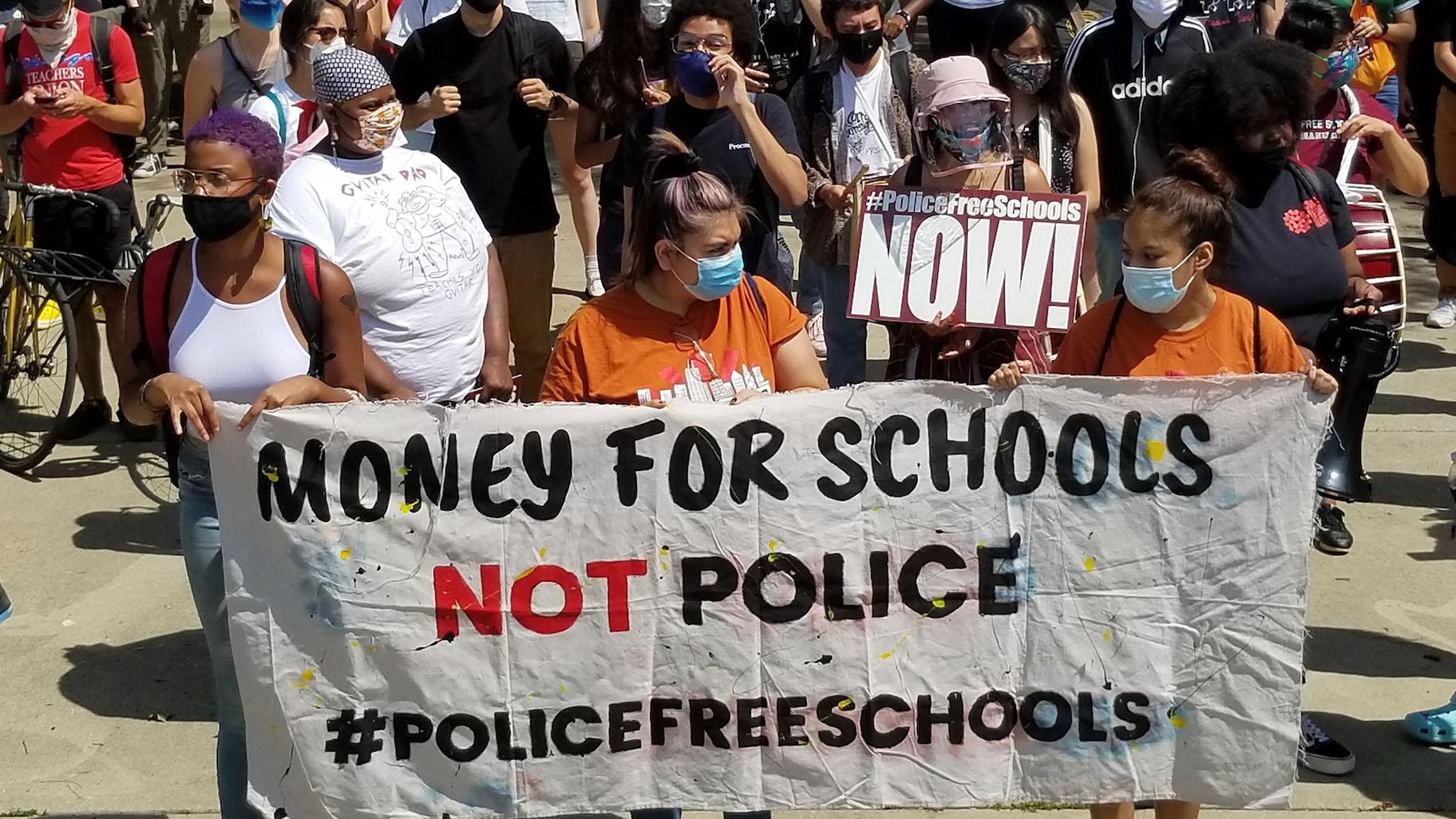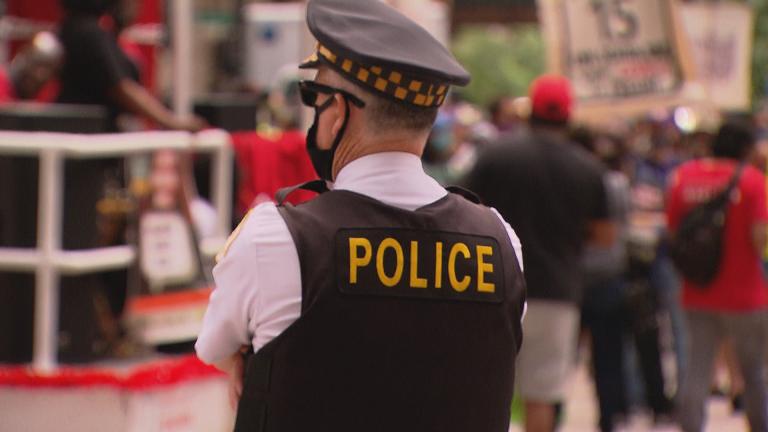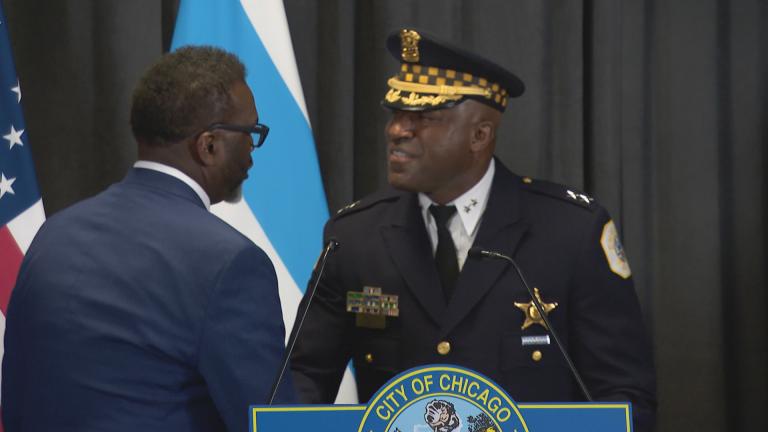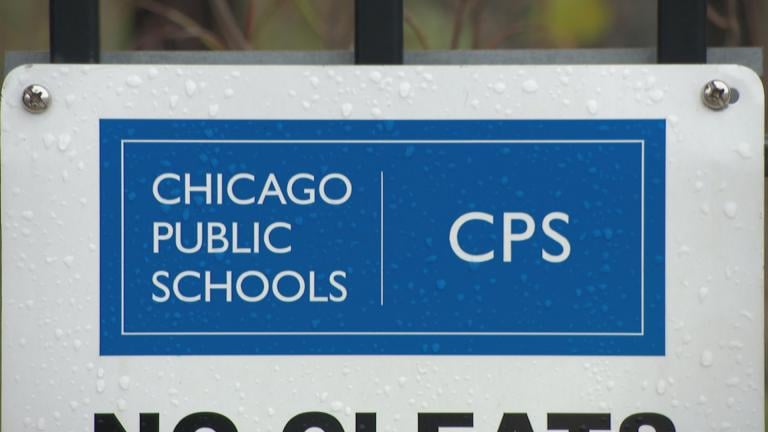 Youth activists organized a peaceful march to Mayor Lori Lightfoot’s home on Aug. 13, 2020, to demand the removal of resource officers from Chicago Public Schools. (Matt Masterson / WTTW News)
Youth activists organized a peaceful march to Mayor Lori Lightfoot’s home on Aug. 13, 2020, to demand the removal of resource officers from Chicago Public Schools. (Matt Masterson / WTTW News)
School resource officers, or SROs, could be removed from all of Chicago’s public high schools beginning this fall, according to a new resolution to be introduced this week by district officials.
The resolution from the city’s Board of Education directs Chicago Public Schools CEO Pedro Martinez to develop and implement a new whole school safety policy, which “must make explicit that the use of SROs within District schools will end by the start of the 2024-2025 school year.”
That resolution will be introduced at the board’s regular monthly meeting Thursday. The board said the new safety policy must be presented for final approval by its June 27 meeting.
Mayor Brandon Johnson had already made clear his intent to move away from SROs, telling the Chicago Sun-Times and WBEZ last month that he’d allow the board not to renew its contract with the Chicago Police Department to provide officers in schools.
The board in its resolution noted that already, only 39 out of 634 district schools currently utilize SROs, while the other campuses “instead employ a wide variety of tools to ensure students’ physical safety, including Crossing Guards, Safe Passage workers, security officers, and security cameras to ensure students can travel safely to and from school.”
Chicago and many other cities across the country began rethinking policing strategies following the murder of George Floyd by Minneapolis police in 2020.
That summer, students and advocates in Chicago began pushing CPS to remove all police from school buildings, saying their presence had a disproportionately negative impact on Black students and strengthened the school-to-prison pipeline.
CPS has since begun allowing individual local school councils to decide whether they wanted to add, maintain or eliminate SRO positions at their schools. The district also retooled its agreements with the police department to better define SRO responsibilities and give school leaders more control over the officers working in their buildings.
Currently, there are 57 total SROs working at 39 CPS schools. Since the district began allowing LSCs to decide on their schools’ safety policies, 14 schools have voted to remove a total of 28 SROs.
According to the board, those schools have instead received $3.9 million in total funds to be invested in staff- and program-related alternative safety interventions like climate and culture, restorative justice and social service coordinators.
Despite that progress, the board in its resolution pointed to continued disparities, including disproportionately higher rates of suspensions and 911 calls for Black students and those with disabilities. Expulsions in district schools are also disproportionately higher for Black and Latino male students.
As part of its resolution, the board is directing CPS to develop a districtwide policy that “codifies best practices for a holistic approach to school safety at every District school.”
To do that, the board wants CPS to evaluate its current policies, practices and resource needs to assess the root causes and contributing factors of the “disproportionalities” for different student groups.
The board is also directing CPS to provide an implementation plan for this new safety policy, showing how the district will work with Johnson’s office, the CPD and “other necessary entities that support physical and emotional safety, and relational trust, for our students, staff, and school communities.”
CPS spokespeople did not immediately respond to a request for comment Tuesday.
State Rep. Mary Gill, D-Chicago, introduced a bill last month that aims to preserve an LSC’s ability to decide whether it wants resource officers at its school.
Chicago Police Superintendent Larry Snelling has said he expects his department will still have a presence around local schools, but will have to “adjust” if the SRO contract is not renewed.
“We’re not gonna be offended because we’re voted out of the schools,” Snelling said during a January speech before the Economic Club of Chicago. “We’re just gonna continue to continue to do the work that we do and make sure these kids are safe.”
A Safer City is supported, in part, by the Sue Ling Gin Foundation Initiative for Reducing Violence in Chicago.
Contact Matt Masterson: @ByMattMasterson | [email protected] | (773) 509-5431







